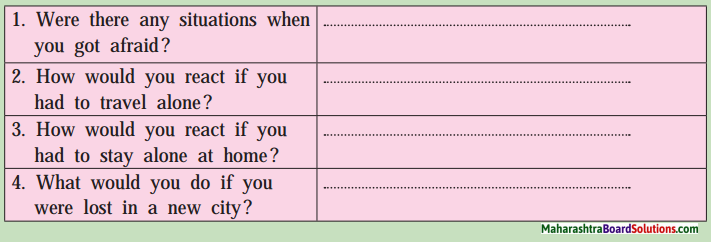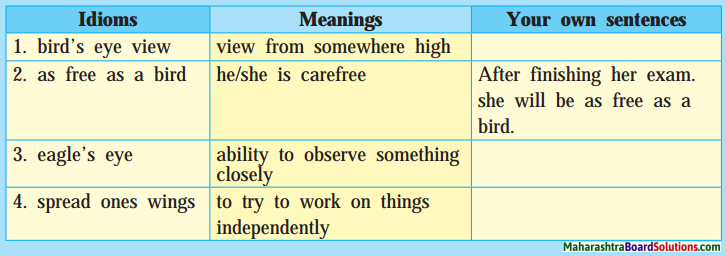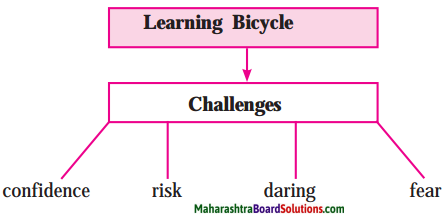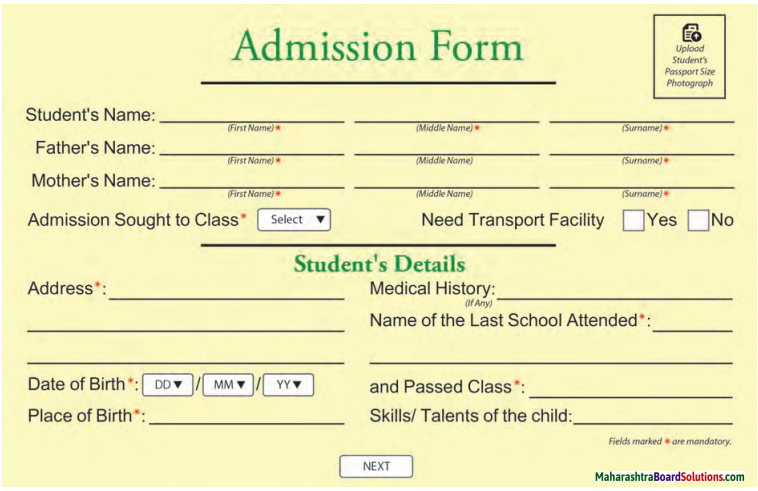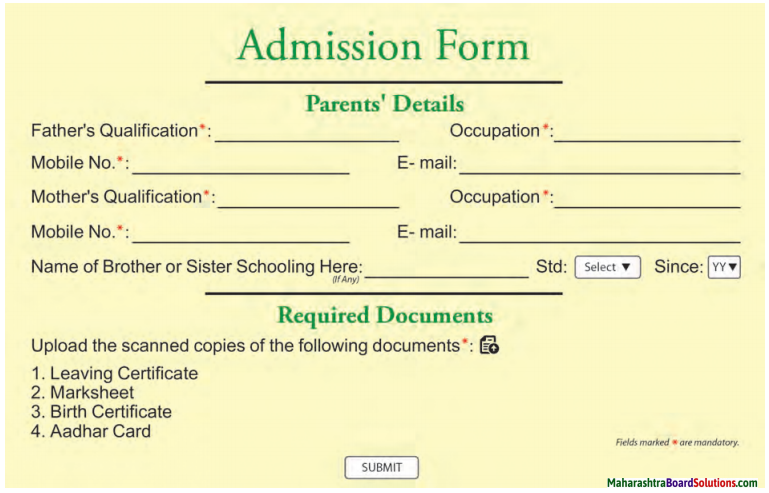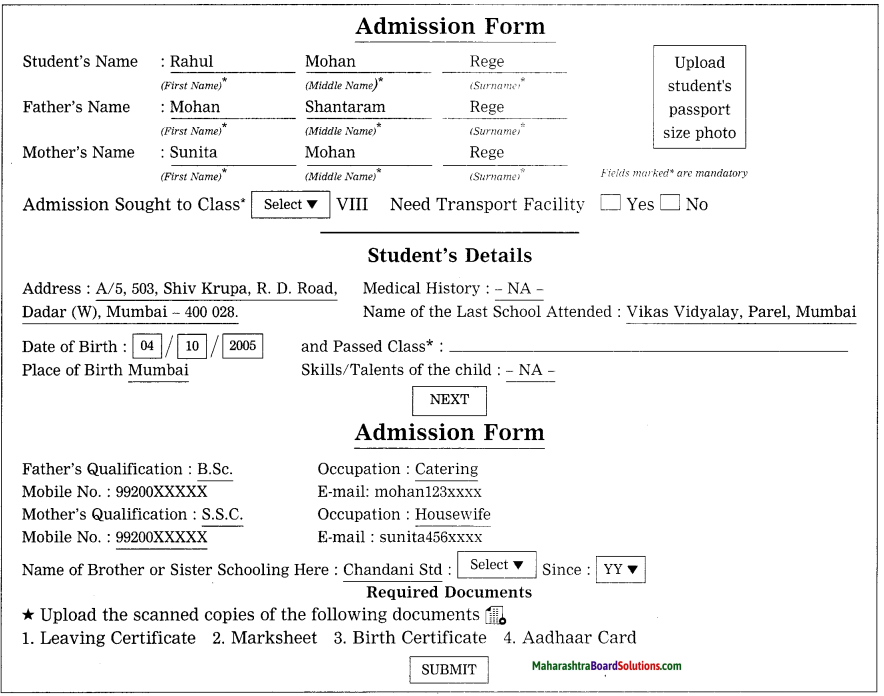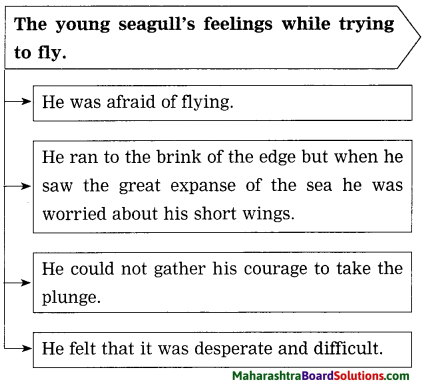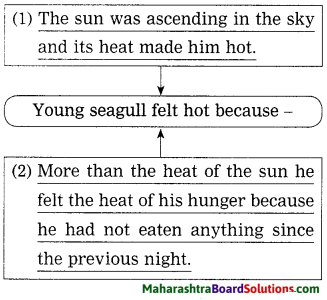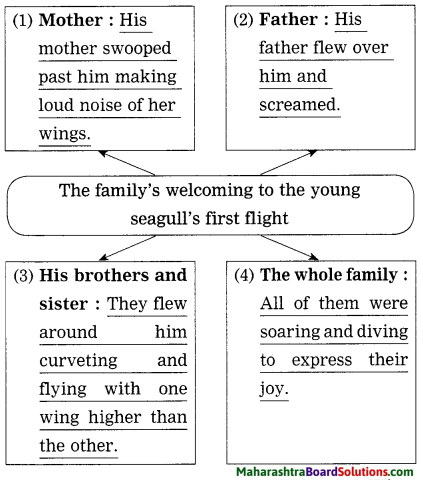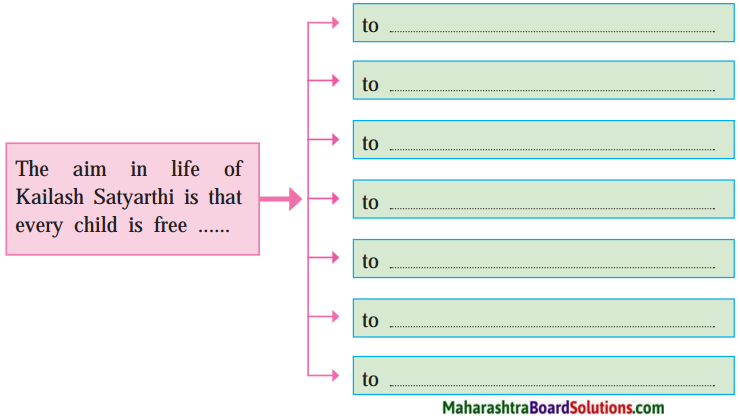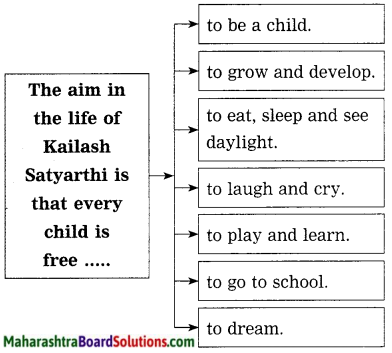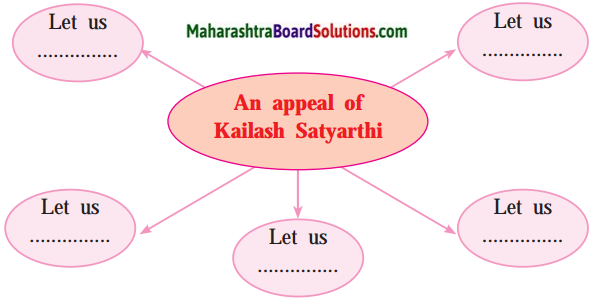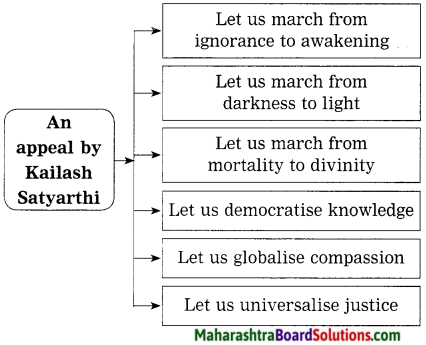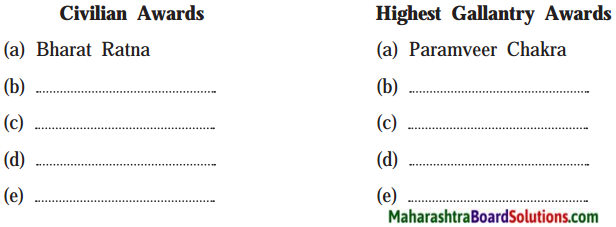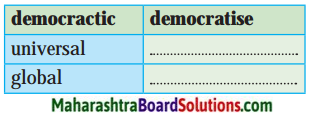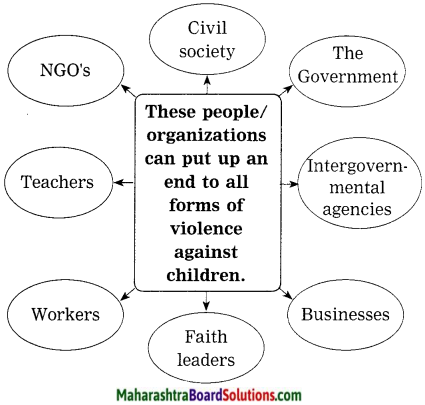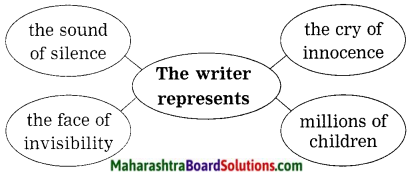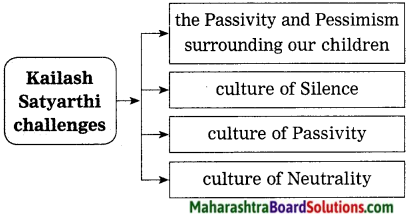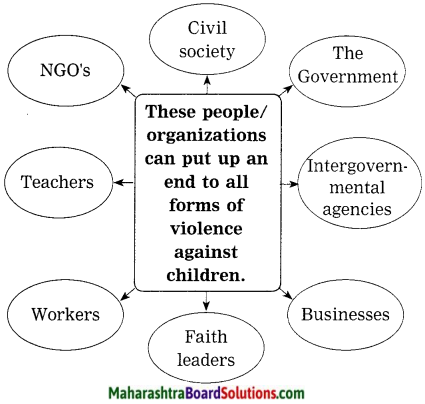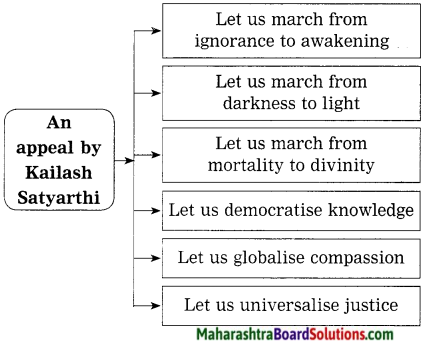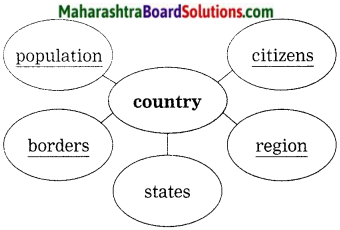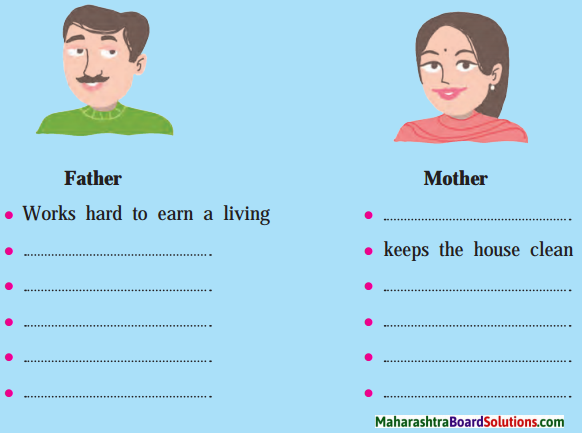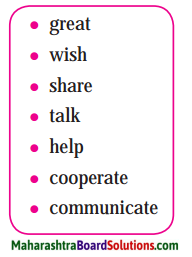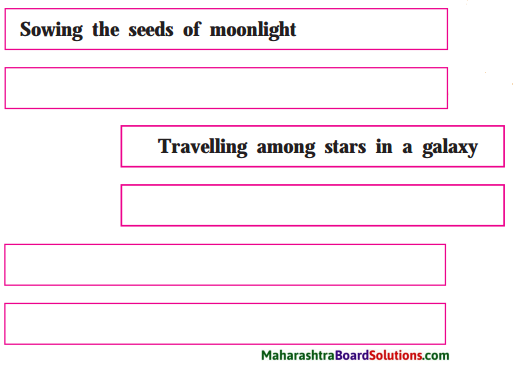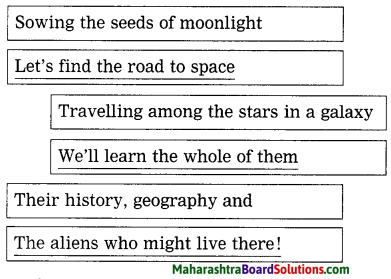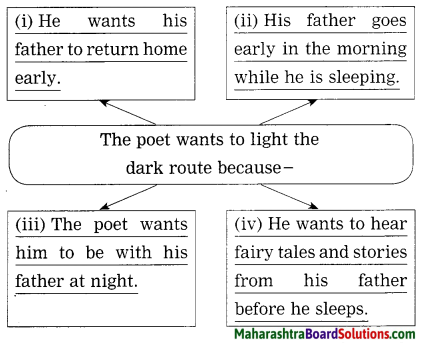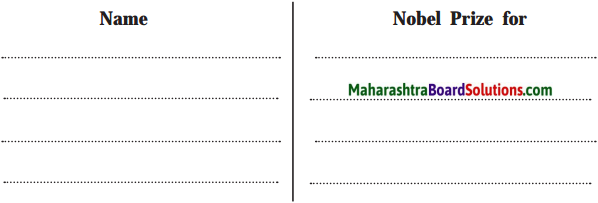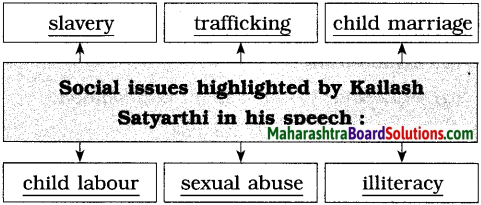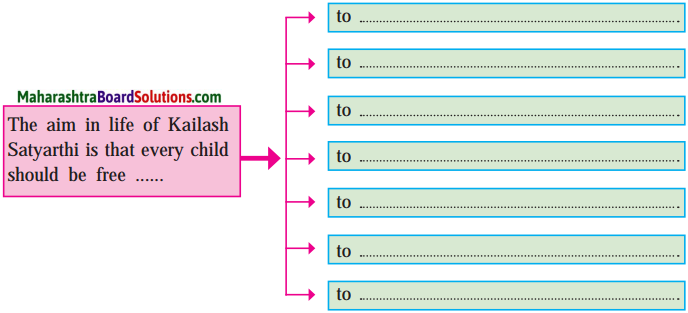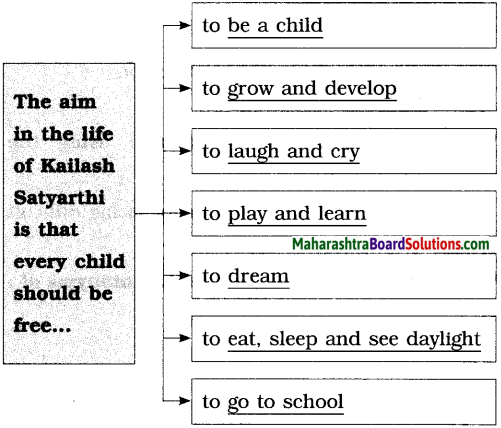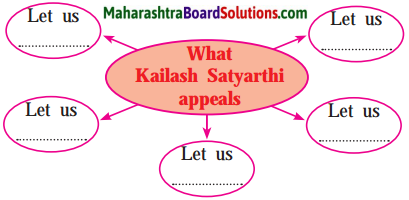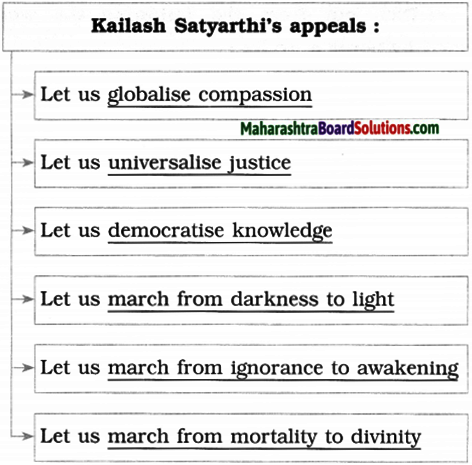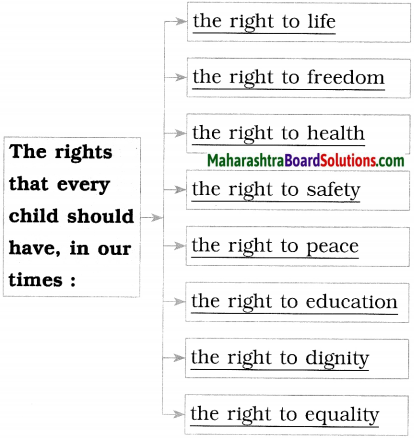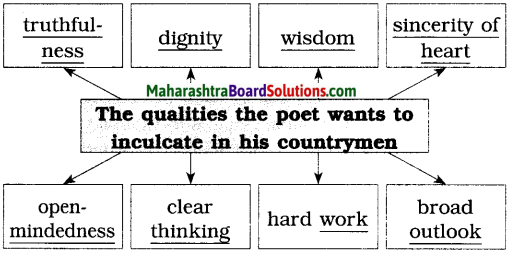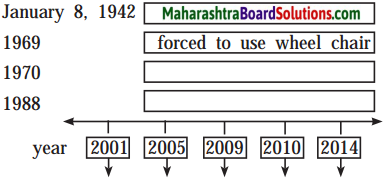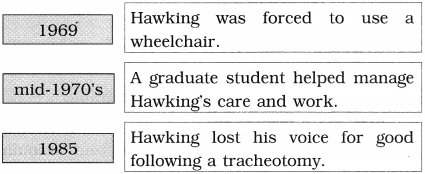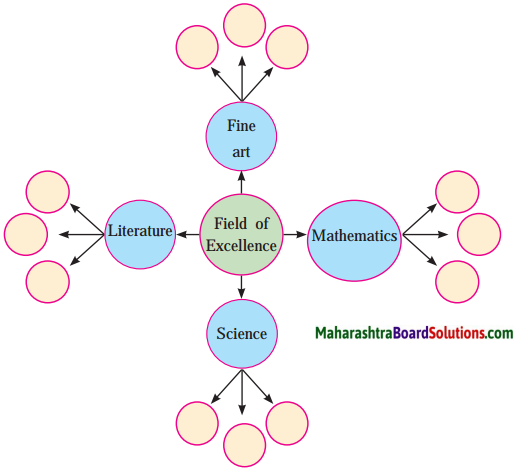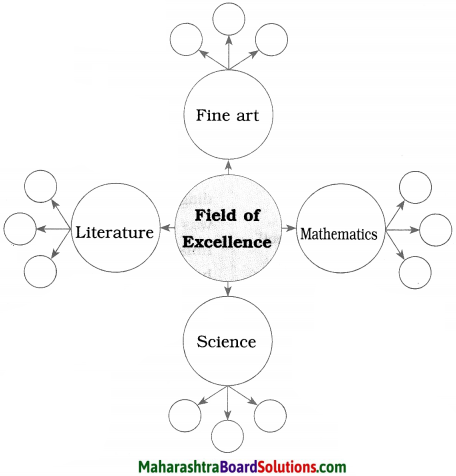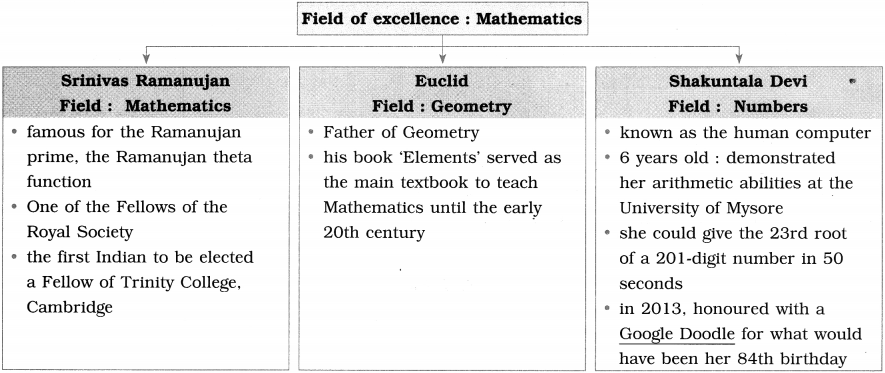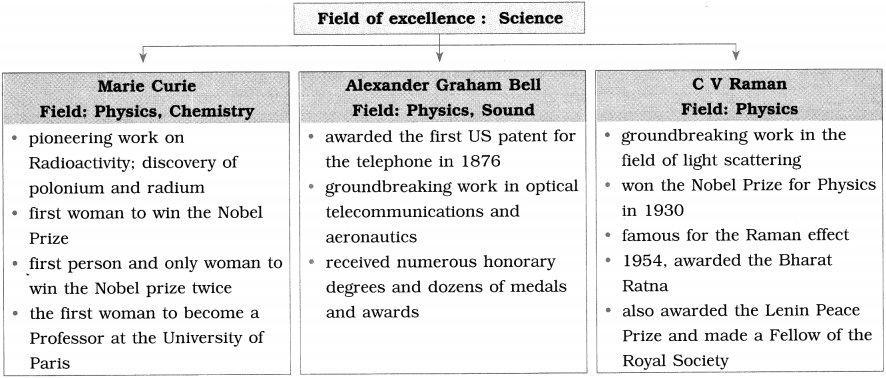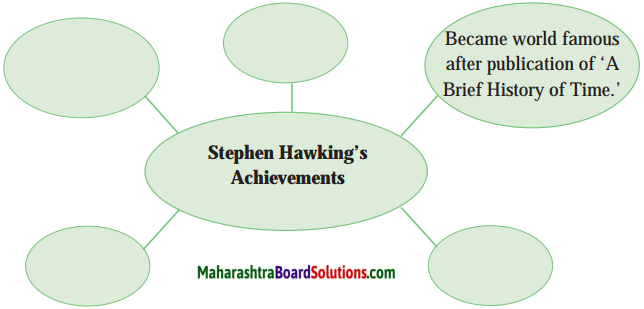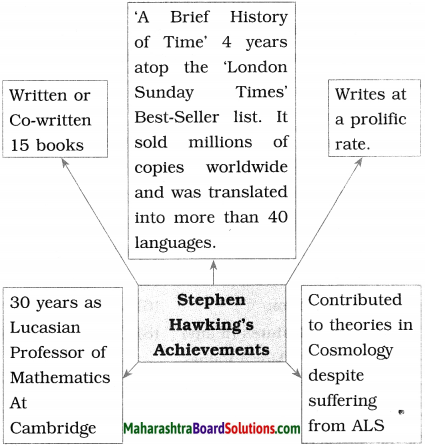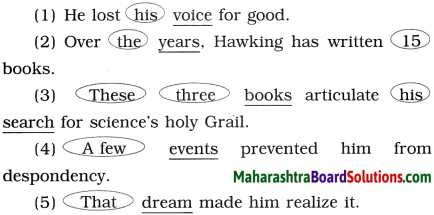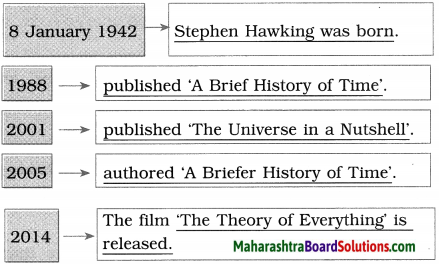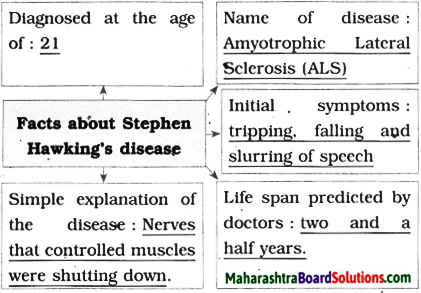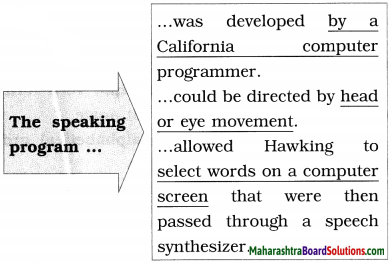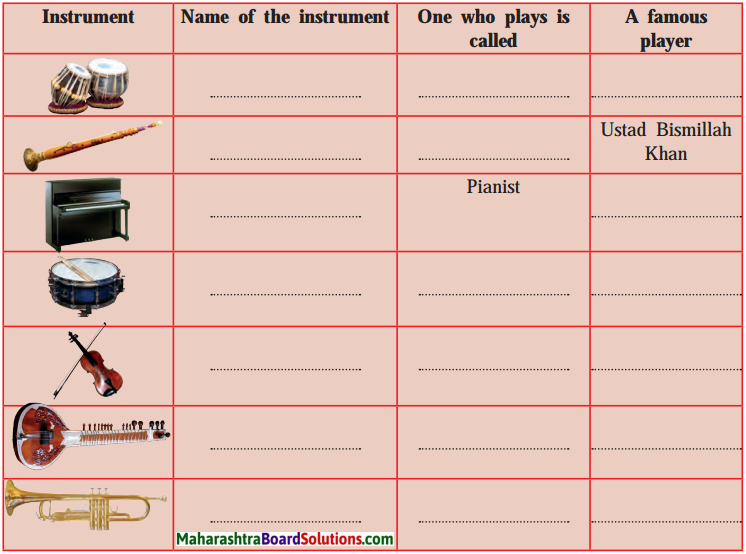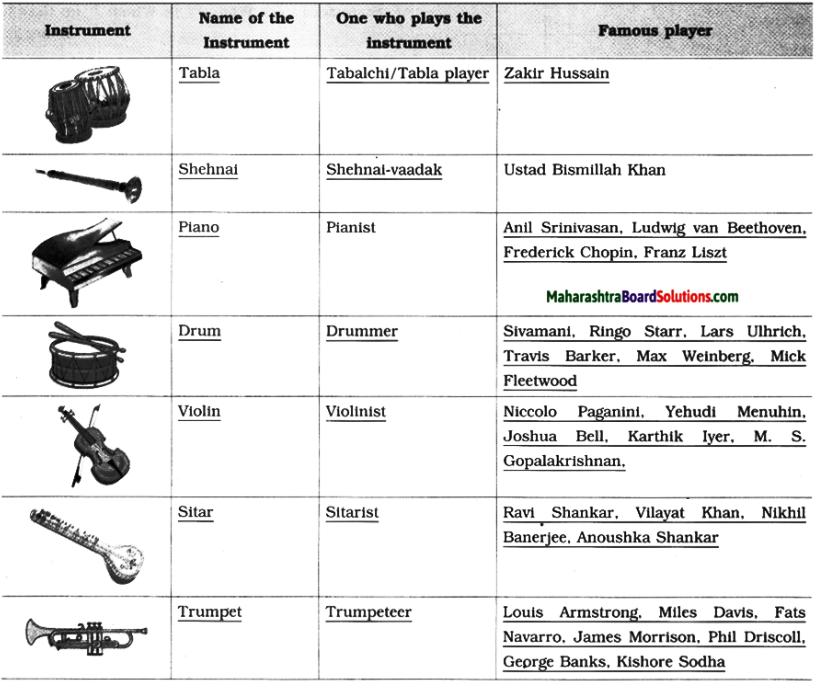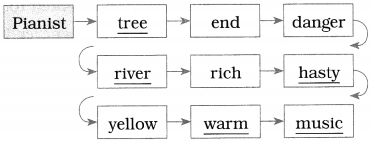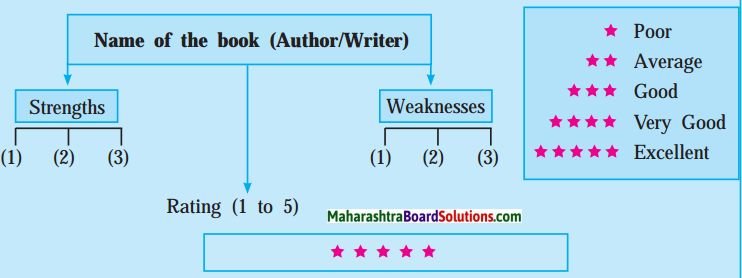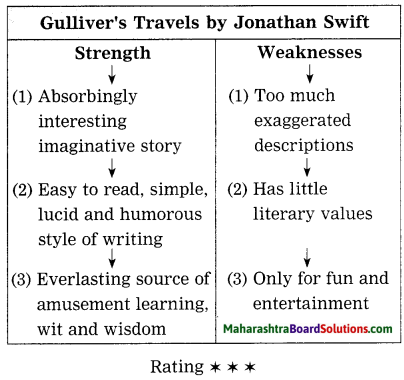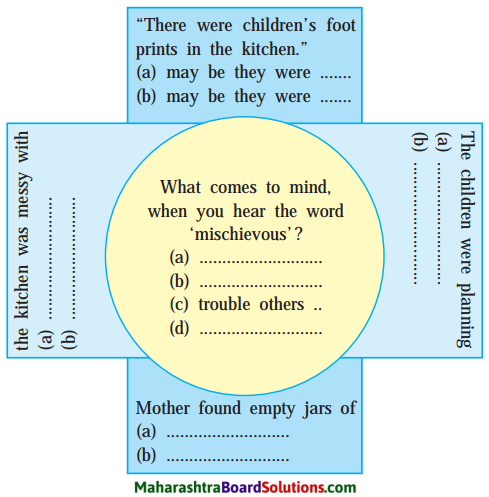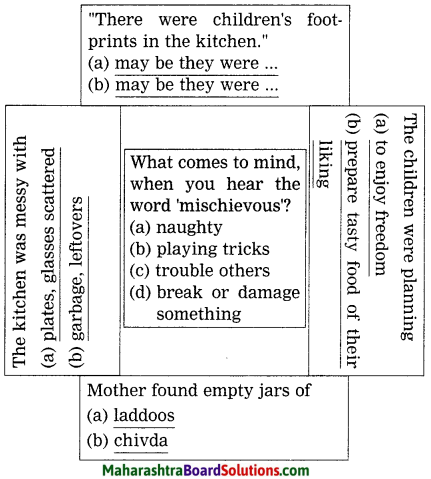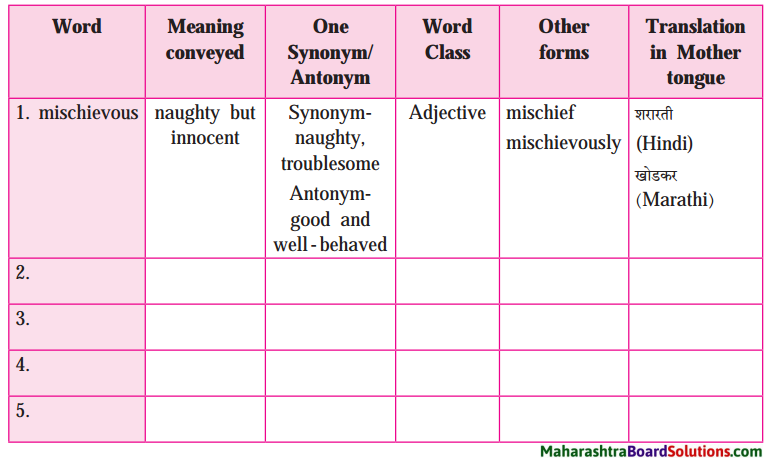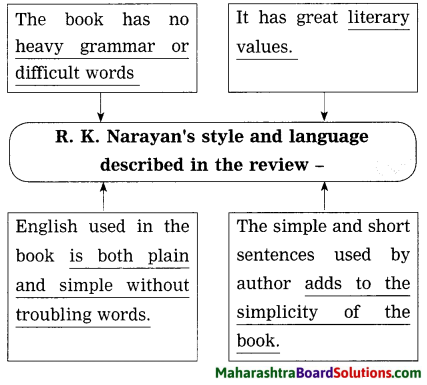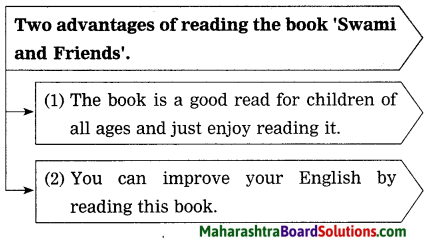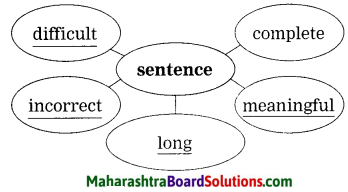Class 10 English Chapter 4.5 Question Answer Maharashtra Board
Balbharti Maharashtra State Board Class 10 English Solutions Unit 4.5 The Old Man and The Sea Book Review Notes, Textbook Exercise Important Questions and Answers.
The Old Man and The Sea Book Review Poem 10th Std Question Answer
Maharashtra Board Class 10 English Solutions Unit 4.5 Warming Up Questions and Answers
The Old Man And The Sea Book Review Class 10 Question 1.
Pair up with your partner and answer the following questions :
(a) Which animal would you relate yourself to and why?
Answer:
I would relate to a cat. This is because like a cat, I am lazy. I am also reserved and do not show my emotions easily. I choose my friends carefully and am not friendly with anybody and everybody.
![]()
(b) Do you have a hero or a role model to look up to? Who is he/she?
Answer:
Yes, my role model is my grandmother. Though she has led a very difficult life because she was poor, she is always optimistic and sees the best in people. She is always cheerful and ready to learn new things. She has learnt how to use the computer and surfs the internet regularly. She is even learning a new language with the help of the computer! She is health-conscious and does yoga regularly. I wish to be like her.
(c) Do you have a passion you would fight for? Why?
Answer:
Yes, my passion is planting trees. Afforestation is the answer to. many of the ills plaguing our country, like water shortage and soil erosion. Planting forests will stop this. When I grow up. I plan to fight for a green cover for our planet.
(d) What is meant by a review?
Answer:
A ‘review’ is a critical evaluation of something – a book, a film, a play, etc.
(e) Have you ever read any book review? If yes, which one? If no, make it a point to read one.
Answer:
Yes, I have read a book review. It was of a Harry Potter book. I read it in a newspaper and it gave me an idea of what to expect in the book, without knowing the details.
The Old Man And The Sea Section 1 Answers Question 2.
Make a list of famous novels of Ernest Hemingway. Two are given to you.
(1) A Farewell to Arms
(2) For Whom the Bell Tolls.
(3) ………………………………………
(4) ………………………………………
(5) ………………………………………
(6) ………………………………………
(7) ………………………………………
Answer:
(1) A Farewell to Arms.
(2) For Whom the Bells Toll.
(3) The Sun also Rises.
(4) The Garden of Eden.
(5) Islands in the Stream.
(6) To Have and Have Not.
(7) The Torrents of Spring.
![]()
The Old Man And The Sea Question Answers Question 3.
Ernest Miller Hemingway was a famous American novelist, short story writer and journalist. Make a list of other famous American novelists. Complete the web filling the boxes with the names of famous American novelists.
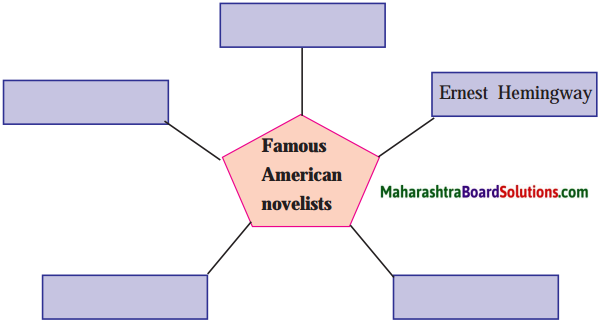
Answer:

The Old Man and The Sea Book Review Class 10 English Workshop Questions and Answers Maharashtra Board
The Old Man And The Sea Book Report Question 1.
Read the passage and name the following.
(a) Young and devoted apprentice
(b) The place where Hemingway had experience of fishing
(c) That which Hemingway was injured by, during First World War
(d) Language of the novel
(e) In his first reading, the review writer was left
Answer:
(a) Manolin
(b) Cuban waters
(c) shrapnel
(d) simple and pithy
(e) unimpressed
![]()
The Old Man And The Sea Book Review Question 2.
Correct the following sentences using facts from the review.
(a) Manolin’s parents insisted on his working with the same old fisherman.
(b) This novel is pure fiction.
(c) Hemingway’s style of writing does not unfold the hidden meaning.
(d) The relationship between the old man and Manolin is coarse.
Answer:
(a) Manolin’s parents insisted on his working with another fisherman.
(b) This novel is based on real events and draws heavily from incidents in Hemingway’s own life.
(c) Hemingway’s style of writing is such that a reader can read his work again and again and find new layers of meaning every time.
(d) The relationship between the old man and Manolin is heart-warming.
The Old Man And The Sea Questions And Answers Question 3.
Compare the points that you would use for a book review with those of the review of a play and write in your notebook.
Answer:
| Book Review | Review of a play | Review of a film |
| (1) Story Line | (1) Story Line, Theme and Climax | (1) Story Line |
| (2) Social/Historical Context | (2) Actors/Actresses and their Presentations | (2) Acting |
| (3) Writing Style | (3) Use of lights, music and special effects | (3) Direction |
| (4) My Thoughts. | (4) Use of Sets, Costumes and Make-up (5) My Thoughts and rating. | (4) Editing (5) Cinematography (6) Music and sound effects (7) Special effects (8) My thoughts and rating |
The Old Man And The Sea Review Question 4.
The line – ‘I first read this novel years ago, when I did not understand it at all and was left unimpressed.’ tells us about the book reviewer’s opinion about the book. Complete the following sentences using the expressions.
(1) In my opinion, every hard working person achieves success in life.
(2) I strongly feel that ……………………………………………………….
(3) I wish I could ……………………………………………………….
(4) As far as I know you ……………………………………………………….
(5) I think ……………………………………………………….
Answer:
(1) every hardworking person achieves success in life.
(2) there should be a complete ban on tobacco.
(3) go to the moon.
(4) have never taken part in a debate.
(5) they know what they are doing.
Old Man And The Sea Book Review Question 5.
The review describes the struggle between the old man with the marlin and sharks, Ernest Hemingway’s struggle against defeat or death and noble struggle against destruction. Find all the words from the text that are related to the word ‘brave’ or ‘courage’.
- strength
- ……………………………………….
- ……………………………………….
- ……………………………………….
- ……………………………………….
Answer:
- strength,
- formidable.
- strong,
- determination,
- endurance,
- triumph,
- struggle.
![]()
The Old Man And The Sea Answers Question 6.
The review mentions struggles of both the writer, Ernest Hemingway and the old man. Fill the incidents of struggle of Hemingway in table A and those of the old man in table B.
| Table A | Table B |
| Ernest Hemingway | Old man |
| • | |
| • | |
| • | |
| • |
Answer:
| Table A | Table B |
| Ernest Hemingway | Old man |
| (1) injured by shrapnel during the First World War | (1) has a run of terrible bad luck |
| (2) faces the destruction caused by the two World Wars | (2) unable to catch fish for 84 days |
| (3) his apprentice, Manolin leaves him | |
| (4) the marlin he hooks is too strong for him | |
| (5) battles with sharks | |
| (6) very near death |
Question 7.
Read the text again. You will find that the text contains many phrases. Match the phrases in ‘A’ and their meanings in ‘B’. After matching their meanings, make sentences of your own
| ‘A’ Phrases | ‘B’ Meanings |
| 1. run of terrible bad luck | a. triggered a feeling or memory |
| 2. draws heavily on | b. without being affected by a particular factor |
| 3. struck a chord | c. endure in difficult circumstances |
| 4. in spite of | d. a period of time when bad things happen |
| 5. holding on | e. makes use of |
Answer:
| ‘A’ Phrases | ‘B’ Meanings |
| 1. run of terrible bad luck | d. a period of time when bad things happen |
| 2. draws heavily on | e. makes use of |
| 3. struck a chord | a. triggered a feeling or memory |
| 4. in spite of | b. without being affected by a particular factor |
| 5. holding on | c. endure in difficult circumstances |
![]()
Question 8.
(A) Rewrite as directed, without change of meaning, in your notebook.
(1) Hemingway’s novel is based on real events. (Convert the underlined adjective to an Adjectival Clause)
(2) He hooks a marlin but the marlin is too strong for him. (Rewrite beginning with ‘Although’)
(3) The reader can read his work again and again and find new layers of menaing. (Begin the sentence with ‘On reading’)
(4) As the novel progresses, the old man and the marlin are inseparably linked. (Rewrite using ‘progress’ as a Noun)
(5) Being strong, the marlin starts pulling the boat. (Rewrite inserting ‘and’ as a Co-ordinator)
(6) When I first read this novel, I was unimpressed. (Rewrite using ‘but’ as a Co-ordinator)
Answer:
(1) Hemingway’s novel is based on events which are real.
(2) Although he hooks a marlin, the marlin is, too strong for him.
(3) On reading his work again and again, the reader can find new layers of meaning.
(4) In the course of the progress of the novel, the old man and the marlin are inseparably linked.
(5) The marlin is strong and starts pulling the boat.
(6) I had read this novel before but I was unimpressed at that time.
(B) Write the ‘root-word’ after dropping the prefix or suffix or both.
(1) unable ……………………………………….
(2) heavily ……………………………………….
(3) determination ……………………………………….
(4) endurance ……………………………………….
(5) unimpressed ……………………………………….
(6) relationship ……………………………………….
(7) inseparably ……………………………………….
(8) empathetic ……………………………………….
(9) beautiful ……………………………………….
(10) simplicity ……………………………………….
Answer:
(1) unable – able
(2) heavily – heavy
(3) determination – determine
(4) endurance – endure
(5) unimpressed – impress
(6) relationship – relate
(7) inseparably – separate
(8) empathetic – empathy
(9) beautiful – beauty
(10) simplicity – simple
![]()
Question 9.
Write a book review on any book of your choice with the help of the following points.
- Story line
- Social/Historical content
- Writing style
- My thought
Answer:
Pride and Prejudice: Book review.
Story Line:
‘Pride and Prejudice’ is a romantic novel written by Jane Austen and first published in 1813. The book follows the life of Elizabeth Bennet, a headstrong, intelligent woman. It takes place in the early 1800s and is about the emotional development of the main character.
Elizabeth has four sisters and no brother. According to the succession rights, none of the girls can inherit the property, and Mrs. Bennet (Elizabeth’s mother) thinks that good marriages are the only way for them to lead a good life. Her main ambition in life is to see that her daughters marry wealthy men. However, the novel emphasizes that one should marry for love and not only for money. Mr. Bennet tolerates his wife’s behaviour and is dryly sarcastic when she is silly. There are villainous characters like George Wickham and comic ones like Mr. Collins.
Social/Historical Context:
In Pride and Prejudice, the Bennets are members of the educated upper middle class. At that time, a man’s income was always reported as a ‘number of pounds per year’. Mr Bingley has ‘four or five thousand a year’ while Darcy’s income is a very impressive 10,000 a yepr. Thus, Darcy is considered to possess a fortune, and hence a very eligible bachelor.
The formal manners of behaviour are obvious in the custom of paying visits and leaving calling cards, the necessity of giving formal introductions, etc. Marriage was considered to be the only acceptable role for any woman, and getting married was high on the list of priorities. The clothes and customs all reflect the time. The French revolution was in progress during the time of the writing of this novel. Though it is difficult to relate to such customs and such priorities today, the novel still holds our interest.
Writing Style:
Jane Austen has portrayed her characters well, and given good character sketches of all, whether it is the silly, materialistic Mrs. Bennet as the mother or Elizabeth as the strong-willed daughter. Jane Austen’s writing is sharp, with plenty of sarcasm and irony. Many times it is a bit too detailed; but that was the style of writing at that time. She wrote about ordinary people and their ordinary lives in an exceptional way. She recognized the flaws in society, especially as far as marriage is concerned. The opening words of her novel, ’It is a truth universally acknowledged, that a single man in possession of a good fortune, must be in want of a wife.’, are unforgettable and are still quoted.
![]()
My Thoughts:
When I first read it, it was out of compulsion; it was a part of our school activity, and I disliked it. I was too small to appreciate the undertones. I found too many unnecessary details. However, when I read it a few years later, I had already read many other books based in that time period. Hence, I could appreciate their customs, their dresses and their way of talking. I had alsu seen a film based on it. and things became clearer. I plan to read it again and see if I can find new meaning in it now.
Question 10.
You know the essential points required for a book review. Now form pairs and find essential points required for a play review and film review. You can take help of your teacher, library or the internet.
| Book Review | Play Review | Film Review |
| – |
Answer:
| Book Review | Play Review | Film Review |
| (1) Story Line (2) Social/Historical Context (3) Writing Style (4) My Thoughts. | (1) Story Line, Theme and Climax (2) Actors/Actresses and their Presentations (3) Use of lights, music and special effects (4) Use of Sets, Costumes and Make-up (5) My Thoughts and rating. | (1) Story Line (2) Acting (3) Direction (4) Editing (5) Cinematography (6) Music and sound effects (7) Special effects (8) My thoughts and rating |
Question 11.
Project
Classroom Library :
Ask all your classmates to donate a book each to the class. In this way everyone will have a book of his/her own to read. Read the book in a week or two. After reading it, exchange your book with your classmate. Keep exchanging and reading books for the whole year. Every fortnight give the book review of the book that you have read recently in the form of a presentation.
Question 12.
Complete the following:
(1) Hemingway had experience of …………………..
(2) He worked for ………………….. during the First World War.
(3) ‘The Old Man and The Sea’ was published in …………………….
Answer:
(1) fishing in the Cuban waters.
(2) The Red Cross
(3) 1952
![]()
Question 13.
Describe the general mood of the people when the novel was published.
Answer:
When the novel was published, people were trying to recover from the mass destruction caused by the two World Wars.
Question 14.
Sentences:
(1) The young actor had a …………………… at the beginning of his career.
(2) This painter …………………… the old masterpieces.
(3) The girl’s sad story immediately …………………… with the news reporter.
(4) Lata Mangeshkar’s songs …………………… for a long time.
Answer:
(1) run of terrible bad luck
(2) draws heavily on
(3) struck a chord
(4) will live on
Question 15.
Find the synonyms (one word) for the following from the passage:
(i) The ability to do something difficult for a long time: ……………
(ii) Formed or worked: ……………
Answer:
(i) endurance
(ii) wrought
Question 16.
The old man is, at the end of the novel, very near death, but we know that the story of his suffering and loss will live on in the memories of the people of his village. (Rewrite the sentence using ‘Though’)
Answer:
Though the old man is, at the end of the novel, very near death, we know that the story of his suffering and loss will live on in the memories of the people of his village.
Question 17.
During the First World War, Hemingway was injured by shrapnel. (Begin the sentence with ‘Shrapnel….’)
Answer:
Shrapnel injured Hemingway during the First World War.
Question 18.
Do you like to read books? If so, what type? If not, why?
Answer:
I do like to read books. I like to read mystery novels. I find them very thrilling and interesting. I am a big fan of Agatha Christie and Arthur Conan Doyle. I have read nearly the whole Sherlock Holmes series of short stories.
Question 19.
(a) After recent reading the reviewer was left: ……………………
(b) It fights for its life desperately: ……………………
Answer:
(a) moved and impressed
(b) the marlin
![]()
Question 20.
Hemingway practises an extreme economy in his use of words’. What does this mean?
Answer:
It means he uses very few words to express his thoughts and ideas.
Question 21.
What are the ideals that the old man and the marlin both stand for?
Answer:
The old man and the marlin both stand for the same ideals, that is, a noble struggle against destruction.
Question 22.
Complete the following web:
Answers:
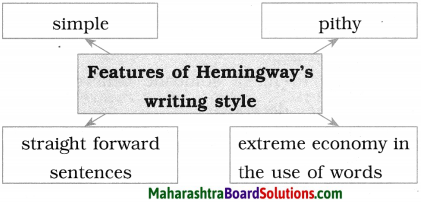
Question 23.
Sentences:
(1) Hussain was ill; in spite of this, he stood first in the test.
(2) I could see the new rider holding on to the reins desperately.
(3) The little boy looked longingly at the puppy again and again.
(4) The symbol of a white dove stands for peace.
Answer:
(1) in spite of
(2) holding on
(3) again and again
(4) stands for
Question 24.
Find the synonyms for the following from the passage:
(i) Brief: …………………..
(ii) Likely to make someone believe something that is not true: ………………….
Answer:
(i) pithy
(ii) deceptive
Question 25.
Write four to five sentences about your favorite writer.
Answer:
My favorite writer is Arthur Conan Doyle, the creator of Sherlock Holmes. Every story written by Doyle is different and holds my interest right till the end. The stories are so gripping that one cannot put the book down easily. I borrow the books from the library to read during the vacation.
![]()
Question 26.
(1) Write down two compound words from the passage.
(2) Pick out an infinitive from the lesson and use it in your own sentence.
(3) Find out five hidden words from the given word t endurance
(4) Use the following phrase in your own sentence: even after his death
(5) Spot the error/errors and rewrite the correct sentence: The novel was publishing in 1952
(6) Identify the type of sentence: I first read this novel years ago, when I did not understand it at all.
(7) Hemingway always talks about the need to struggle. (Replace the infinitive with a gerund.)
(8) From the following verbs, pick out the verb which forms its present and past participle by doubling the last letter: run, write, swim, fan.
(9) Complete the word chain with verbs of your own. write, e………., r………., r………., t……… .
Answer:
(1) fisherman, baseball
(2) to catch: The fielder tried to catch the ball.
(3) endurance: endure, dance, under, crane, creed.
(4) even after his death: People remembered the great leader with love and respect even after his death.
(5) The novel was published in 1952
(6) Assertive (negative)
(7) Hemingway always talks about the need for struggling.
(8) fan – fanning, fanned.
(9) write, enter, remember, report, think.
Question 27.
(1) Use the following word and its homophone in two separate sentences: sail
(2) He worked for the Red Cross. (Rewrite using the past progressive tense of the verb.)
(3) A reader can read his work again and again. (Change the voice beginning ‘His work ….)
Answer:
(1) (i) The sail of the huge boat fluttered in the breeze,
(ii) The old woman loves shopping wherever there is a sale.
(2) He was working for the Red Cross.
(3) His work can be read again and again (by a reader).
![]()
Question 28.
(1) Use the given two words in one meaningful sentence: formidable, beautiful.
(2) Recently, I read this book again and was extremely moved. (Rewrite as a complex sentence.)
Answer:
(1) It was a formidable job to make the dilapidated old house beautiful again.
(2) I was extremely moved when I recently read the book again.
English Kumarbharati 10th Digest PDF
- A Thing of Beauty is a Joy For Ever 10th English Textbook Solutions
- The Luncheon 10th English Textbook Solutions
- World Heritage 10th English Textbook Solutions
- The Height of the Ridiculous 10th English Textbook Solutions
- The Old Man and The Sea Book Review 10th English Textbook Solutions
- The Gift of the Magi 10th English Textbook Solutions
